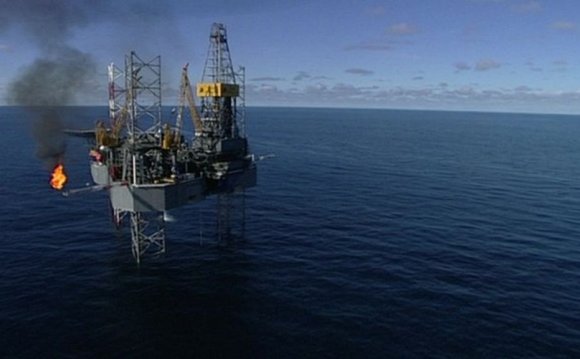
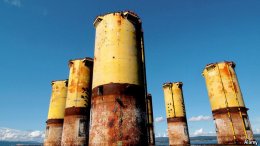 NORMALLY Britain’s politicians would rather be seen peddling green schemes or bashing power firms than gladhanding oilmen. Yet on February 24th bigwigs from the British and Scottish governments travelled to Aberdeen, the country’s oil capital, to hold separate cabinet meetings a few miles apart. Both camps hoped to persuade voters in this year’s referendum on Scottish independence that they alone could ensure the oil industry’s future. Both of them struck a dry hole.
NORMALLY Britain’s politicians would rather be seen peddling green schemes or bashing power firms than gladhanding oilmen. Yet on February 24th bigwigs from the British and Scottish governments travelled to Aberdeen, the country’s oil capital, to hold separate cabinet meetings a few miles apart. Both camps hoped to persuade voters in this year’s referendum on Scottish independence that they alone could ensure the oil industry’s future. Both of them struck a dry hole.
The North Sea produces almost half of the energy Britain needs. Scottish nationalists hope the taxes it generates, which amounted to £6.5 billion ($10.1 billion) last year, will make an independent state rich. But the oil and gas is running out. Production fell by 6% a year on average between 1999 and 2010; since then it has dived by nearly 40% (see first chart). Meanwhile costs are spurting upwards: it is nearly five times more expensive to extract a barrel of North Sea oil than it was in 2002. Investment in exploration, which once rose and fell with the oil price, is at rock bottom (see second chart) even though nine billion barrels may remain unfound. On February 25th Malcolm Webb of Oil & Gas UK, an industry body, said exploration is facing its biggest challenge in 50 years.
Some of these problems are simply signs of age. Britain’s offshore fields have gushed for longer than pioneers expected; as a result, much time and cash must be spent maintaining ageing kit. As the most profitable reserves dwindle, drillers are opening up smaller fields in more difficult locations, such as the deep, wild waters found west of the Shetland Islands.
Yet roughnecks say the British government’s policies have made an ever-trickier job harder. Oilmen once thought the North Sea a safe harbour from risks run in more exotic places, but successive tax grabs have changed their minds. The Labour government increased corporation tax for oil firms in 2002 and 2006; in 2011 the coalition raised it again, crushing investment. Westminster has churned through 14 energy ministers in 17 years.
The British government also took ages to clarify how the costs of decommissioning rigs will be divided, discouraging new entrants from buying elderly fields. Even as web entrepreneurs are coddled in London, a shortage of skilled engineers pushes up labour costs in Aberdeen. In a report published on February 24th Sir Ian Wood, a veteran oilman, argued that politicians have let the industry regulator grow toothless. He said a beefier body would help firms extract small, hard-to-reach deposits, in part by forcing competitors to more fairly share pipelines and other infrastructure.
A brief turnaround in the industry’s fortunes could give the authorities a chance to rethink. New tax incentives for oil firms taking on very complex projects, combined with a high oil price, has encouraged a flurry of investment into old fields and those once thought too costly to exploit. As a result, oil and gas production will probably rise this year for the first time in over a decade—though it will soon sink again unless exploration increases. Ed Davey, the energy secretary, promised to implement Sir Ian’s recommendations swiftly. Nationalists followed suit.
As the North Sea begins to run dry, another industry is thriving. The revenues of Britain’s thousand-odd oil services firms rose by 17% between 2010 and 2011, to £27 billion, according to EY, an accountancy firm. The small oil companies now investing in the North Sea are hungry for cost-cutting tools and tricks but do not have large research and service arms of their own, so they buy expertise. But the boom also reflects demand for British skills abroad. Subsea UK, which represents underwater engineering companies, reckons its members account for 45% of the global market and make half their cash outside Britain.
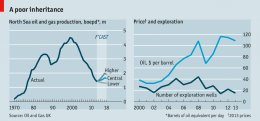 Alex Salmond, Scotland’s first minister, says his Scottish National Party would do a better job of exploiting the North Sea, should the country plump for independence in September. He pledges to pour revenues into a national fund that will smooth the impact of oil booms and busts on Scotland’s economy, and give it cash to invest. Norway’s thrifty governments have stashed away 0 billion from their share of the North Sea’s treasure. Gavin McCrone, an economist and former government adviser, calls Britain’s failure to save its oil money “a serious mishandling of the greatest opportunity for the economy in the last half century”.
Alex Salmond, Scotland’s first minister, says his Scottish National Party would do a better job of exploiting the North Sea, should the country plump for independence in September. He pledges to pour revenues into a national fund that will smooth the impact of oil booms and busts on Scotland’s economy, and give it cash to invest. Norway’s thrifty governments have stashed away 0 billion from their share of the North Sea’s treasure. Gavin McCrone, an economist and former government adviser, calls Britain’s failure to save its oil money “a serious mishandling of the greatest opportunity for the economy in the last half century”.
A shaky platform
Up to now oil bosses have mostly avoided the independence debate. “People are all scared to express their opinions, ” admits Francis Neill of EV, a company that makes video cameras which work down wells. But most think a Scottish state would raise taxes further. Some fear having to deal with more bureaucracy—about half the North Sea’s oil services firms are based in England, and many Scottish ones have facilities on both sides of the border. Separation might complicate their work, and perhaps even drive some abroad.
In theory the oil industry’s crucial contribution to a new Scottish state ought to guarantee careful treatment from the country’s leaders. But city councillors already complain that the nationalist government in Edinburgh has failed to grant Aberdeen the money it needs to thrive. The industry fears its choked-up roads and unsightly centre are making it more difficult to attract workers who could earn as much in Houston or Stavanger.
An independent Scotland would start life with a large budget deficit. That would probably make it impossible to start an oil fund for some years, at least without big cuts to public expenditure. And nationalists may well be overestimating how much of the gloopy stuff they can squeeze out. Holyrood’s prediction for oil revenues in 2018 is twice Westminster’s estimates. The difference is important. With a big haul, Scotland’s politicians could perhaps afford to cosset oil firms. Without one, the young nation might have to milk them harder than ever.
See also:RELATED VIDEO
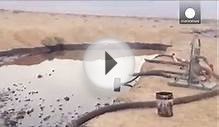



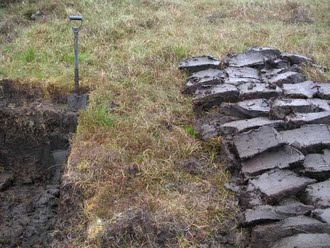 Peat (turf) is an accumulation of partially decayed vegetation. One of the most common components is Sphagnum moss, although many other plants can contribute. Soils that contain mostly peat are known as a histosol. Peat forms in wetland conditions, where flooding...
Peat (turf) is an accumulation of partially decayed vegetation. One of the most common components is Sphagnum moss, although many other plants can contribute. Soils that contain mostly peat are known as a histosol. Peat forms in wetland conditions, where flooding...








